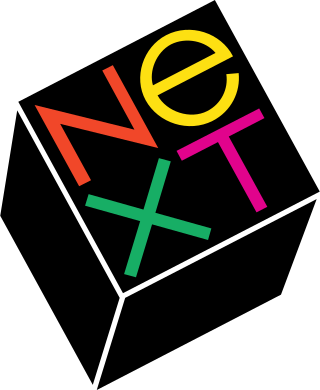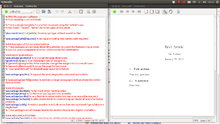
LaTeX is a software system for typesetting documents. LaTeX markup describes the content and layout of the document, as opposed to the formatted text found in WYSIWYG word processors like Microsoft Word, LibreOffice Writer and Apple Pages. The writer uses markup tagging conventions to define the general structure of a document, to stylise text throughout a document, and to add citations and cross-references. A TeX distribution such as TeX Live or MiKTeX is used to produce an output file suitable for printing or digital distribution.
TeX, stylized within the system as TeX, is a typesetting system which was designed and written by computer scientist and Stanford University professor Donald Knuth and first released in 1978. TeX is a popular means of typesetting complex mathematical formulae; it has been noted as one of the most sophisticated digital typographical systems.

NeXTSTEP is a discontinued object-oriented, multitasking operating system based on the Mach kernel and the UNIX-derived BSD. It was developed by NeXT Computer, founded by Steve Jobs, in the late 1980s and early 1990s and was initially used for its range of proprietary workstation computers such as the NeXTcube. It was later ported to several other computer architectures.

Mac OS X Server is a series of discontinued Unix-like server operating systems developed by Apple Inc. based on macOS. It provided server functionality and system administration tools, and tools to manage both macOS-based computers and iOS-based devices, network services such as a mail transfer agent, AFP and SMB servers, an LDAP server, and a domain name server, as well as server applications including a Web server, database, and calendar server.

OpenStep is an object-oriented application programming interface (API) specification developed by NeXT. It provides a framework for building graphical user interfaces (GUIs) and developing software applications. OpenStep was designed to be platform-independent, allowing developers to write code that could run on multiple operating systems, including NeXTSTEP, Windows NT, and various Unix-based systems. It has influenced the development of other GUI frameworks, such as Cocoa for macOS, and GNUstep.

LyX is an open source, graphical user interface document processor based on the LaTeX typesetting system. Unlike most word processors, which follow the WYSIWYG paradigm, LyX has a WYSIWYM approach, where what shows up on the screen roughly depicts the semantic structure of the page and is only an approximation of the document produced by TeX.

The device independent file format (DVI) is the output file format of the TeX typesetting program, designed by David R. Fuchs and implemented by Donald E. Knuth in 1982. Unlike the TeX markup files used to generate them, DVI files are not intended to be human-readable; they consist of binary data describing the visual layout of a document in a manner not reliant on any specific image format, display hardware or printer. DVI files are typically used as input to a second program which translates DVI files to graphical data. For example, most TeX software packages include a program for previewing DVI files on a user's computer display; this program is a driver. Drivers are also used to convert from DVI to popular page description languages and for printing.

ConTeXt is a general-purpose document processor. Like LaTeX, it is derived from TeX. It is especially suited for structured documents, automated document production, very fine typography, and multilingual typesetting. It is based in part on the TeX typesetting system, and uses a document markup language for manuscript preparation. The typographical and automated capabilities of ConTeXt are extensive, including interfaces for handling microtypography, multiple footnotes and footnote classes, and manipulating OpenType fonts and features. Moreover, it offers extensive support for colors, backgrounds, hyperlinks, presentations, figure-text integration, and conditional compilation. It gives the user extensive control over formatting while making it easy to create new layouts and styles without learning the low-level TeX macro language.
MiKTeX is a free and open-source distribution of the TeX/LaTeX typesetting system compatible with Linux, MacOS, and Windows. It also contains a set of related programs. MiKTeX provides the tools necessary to prepare documents using the TeX/LaTeX markup language, as well as a simple TeX editor, TeXworks. The name comes from the login credentials of the chief developer Christian Schenk, MiK for Micro-Kid.

XeTeX is a TeX typesetting engine using Unicode and supporting modern font technologies such as OpenType, Graphite and Apple Advanced Typography (AAT). It was originally written by Jonathan Kew and is distributed under the X11 free software license.
Yet Another Previewer is the name of two different document previewing applications, one for DVI and one for PostScript.

TeXnicCenter is a free and open-source IDE for the LaTeX typesetting language. It uses the MiKTeX or TeX Live distributions. It allows the user to type documents in LaTeX and to compile them in PDF, DVI or PS. A menu gives access to precoded elements and environments. It also allows for the creation of projects to organize and access the sections and environments of documents, and to insert a bibliography and an index. TeXnicCenter was first released in 1999 by Sven Wiegand, it is included in ProTeXt and since version 2.02 it supports UTF-8 encoding.

WinEdt is a shareware Unicode (UTF-8) editor and shell for Microsoft Windows. It is primarily used for the creation of TeX documents, but can also be used to edit HTML or any other type of text file. It can be configured to run as a front-end for a variety of TeX systems, including MiKTeX, fpTeX and TeX Live. WinEdt's highlighting schemes can be customized for different modes and its spell checking functionality supports multi-lingual setups, with dictionaries (word-lists) for many languages available for downloading from WinEdt's Community Site. It supports DVI and PDF workflow.

TeX Live is a cross-platform, free software distribution for the TeX typesetting system that includes major TeX-related programs, macro packages, and fonts. It is the replacement of its no-longer supported counterpart teTeX. It is now the default TeX distribution for several Linux distributions such as openSUSE, Fedora, Debian, Slackware, Ubuntu, Termux and Gentoo. Other Unix operating systems like OpenBSD, FreeBSD and NetBSD have also converted from teTeX to TeX Live.
MacTeX is a free redistribution of TeX Live, a typesetting environment based on TeX. While TeX Live is designed to be cross-platform, MacTeX includes Mac-specific utilities and front-ends. It is also pre-configured to work out-of-the-box with macOS, as it provides sensible defaults for configuration options that, in TeX Live, are left up to the user to allow for its cross-platform compatibility.
The computer program pdfTeX is an extension of Knuth's typesetting program TeX, and was originally written and developed into a publicly usable product by Hàn Thế Thành as a part of the work for his PhD thesis at the Faculty of Informatics, Masaryk University, Brno, Czech Republic. The idea of making this extension to TeX was conceived during the early 1990s, when Jiří Zlatuška and Phil Taylor discussed some developmental ideas with Donald Knuth at Stanford University. Knuth later met Hàn Thế Thành in Brno during his visit to the Faculty of Informatics to receive an honorary doctorate from Masaryk University.
Two major families of Mac operating systems were developed by Apple Inc.

iStudio Publisher is a page layout and desktop publishing (DTP) application developed by iStudio Software.
Verbosus is a browser-based LaTeX editor which allows a user to create and handle LaTeX projects in a browser. The graphical user interface (GUI) does deliberately not resemble non-browser-based Editors such as TeXworks. It was designed to function and being used in a browser.












